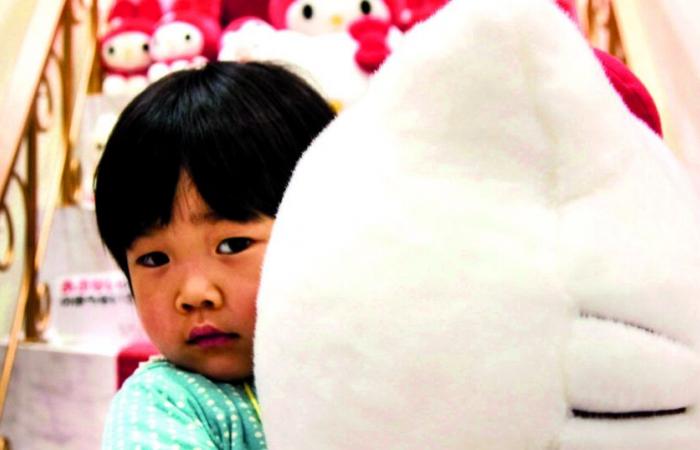A missing part, with Romain Duris, illustrates, in the land of the rising sun, the drama of separated parents, deprived of their children. A law revives hope.
Immediate expulsion to France or ten years in a Japanese prison. Here is the terrible deal that the prosecutor offers to the character played by Romain Duris in A missing partthe new film by Guillaume Senez. His “crime”: having spent a few hours with his teenage daughter whom his ex-Japanese partner had kidnapped nine years previously and whom he had never seen since. An almost banal tragedy in Japan where, according to government figures, more than 70% of divorces result in the complete severance of ties with one of the two parents.
According to the NGO Kizuna Child-Parent Reunion, this situation affects more than 150,000 children each year. All in perfect legality. Because, as incredible as it may seem, Japanese justice does not recognize shared custody or visiting rights. In fact, in the event of a conflictual separation, the parent who does not have custody of their children will no longer see them until they reach the age of majority. In the country, kidnapping your children and taking them away from your former spouse is neither a crime nor a misdemeanor.
”
data-script=”https://static.lefigaro.fr/widget-video/short-ttl/video/index.js”
>
Worse, kidnapping is often recommended by lawyers, because judges systematically grant custody to the parent who has the children under their roof at the time of the divorce. Even more violent, if after this pronouncement, the parent who kidnapped the child remarries, the name of the biological parent will simply disappear. A total, legal and definitive parental death.
Go to hell
“With Romain Duris, in 2018, we were in Japan to promote Our battlesthe first film we made together, explains director Guillaume Senez. During an evening, expats spoke to us about these intra-family kidnappings. These stories of parents falling into hell shocked me and I decided to tell their story.” These kidnappings do not only affect foreigners but also many Japanese people.
“Children born to two Japanese people still represent the majority of kidnapping cases,” explains François Roussel, representative of French people living abroad in Japan. But it is mainly expatriate men who publicize their fight.
If children are sometimes estranged from their mother, the vast majority of cases concern the breakdown of paternal ties. In 2022, according to the latest figures provided by the government, 86% of kidnappers are women. According to François Roussel, who has lived in Japan for more than thirty years, the traditional conception of the distribution of roles between men and women is one of the main causes of these tragedies.
The child is considered household furniture
Jessica Finelle, avocate
“Public opinion considers that the child is not a subject in itself but an extension of the mother,” he continues. And strangely, most Japanese feminists are opposed to joint custody and actively support women who abduct their children. Japanese men, for their part, experience the situation as a shame and do not dare to revolt, following the battles from afar in the light of the gaijins, as foreigners living in Japan are sometimes contemptuously called.
Fathers can lose everything
To write his film, Guillaume Senez met several of these French people who live this drama in their flesh on a daily basis, such as Emmanuel de Fournas, Vincent Fichot or Stéphane Lambert who, for many years, have been trying to reconnect with their children. Without any convincing results. “We have to be lucid, the parent whose child has been kidnapped has no recourse,” explains Jessica Finelle, their lawyer. And if the victim parent tries to approach their child, they may find themselves prosecuted for child kidnapping. Several victim parents were thus placed in detention…”
Emmanuel de Fournas, a French entrepreneur, for example, remained in police custody for twenty-three days (the maximum legal duration in Japan), in a cell of six square meters, without shower and without care, for having attempted to see his little daughter again. When misfortune befalls them, these fathers lose everything, their children but also their house, their job, exhausting themselves in long procedures and exorbitant expenses. Because if they do not have visitation rights, they still have to pay very expensive alimony. A grotesque situation that pushes many to give up and give up the fight when some, like Arnaud Simon and Christophe Guillermin, end up committing suicide, devastated.
”
data-script=”https://static.lefigaro.fr/widget-video/short-ttl/video/index.js”
>
“These fathers don’t live, they survive,” explains director Guillaume Senez. They fight so that their children will one day understand what really happened, and that they did everything to find them, without ever giving up. » This situation is difficult to believe from our Western point of view, but in Japan, even today, the well-being of the child does not count, justice makes a total abstraction of it and society, in its almost globality, does not see the child as a being with rights. “In fact, it is considered a piece of household furniture which cannot, after a separation, be shared between two different households,” protests Jessica Finelle.
Faced with international pressure, the situation is starting to change. On May 17, the Japanese parliament voted for an amendment to the Civil Code which could lead to the establishment of joint parental authority during a divorce judgment with the choice between sole custody and joint custody. But, in reality, this might not change anything. “The new law is incredibly hypocritical because it only allows the sharing of parental authority if it is accepted by both parents. However, in essence, a parent who removes their child and cuts them off from all contact with the other parent will not agree to share parental authority with them!”
70% of citizens are against this development
While waiting for things to finally change, the resistance is organizing itself as best it can. Expatriate associations and the consulate website have written booklets to explain Japanese laws on divorce, and support groups have been set up to help fathers out of their isolation. But everyone knows that the road will be long and painful. Especially since Japanese public opinion remains very reluctant since, according to a survey carried out on the government website, more than 70% of citizens are against this development.
”
data-script=”https://static.lefigaro.fr/widget-video/short-ttl/video/index.js”
>
“I think it will be difficult to find a distributor in the country,” regrets director Guillaume Senez. An observation shared by lawyer Jessica Finelle, who nevertheless sees in the release ofA missing part a real opportunity. “It would be great for it to be released in Japan, because it would help raise awareness,” she explains. But my clients are already delighted with this film which tells their story. Because they hope to show it to their children one day to help them understand what they experienced.” Like a fragile Ariadne's thread, which would finally allow us to reconnect with these children condemned to grow up without them…
A missing part, by Guillaume Senez, with Romain Duris, Judith Chemla, Yumi Narita… In theaters.






